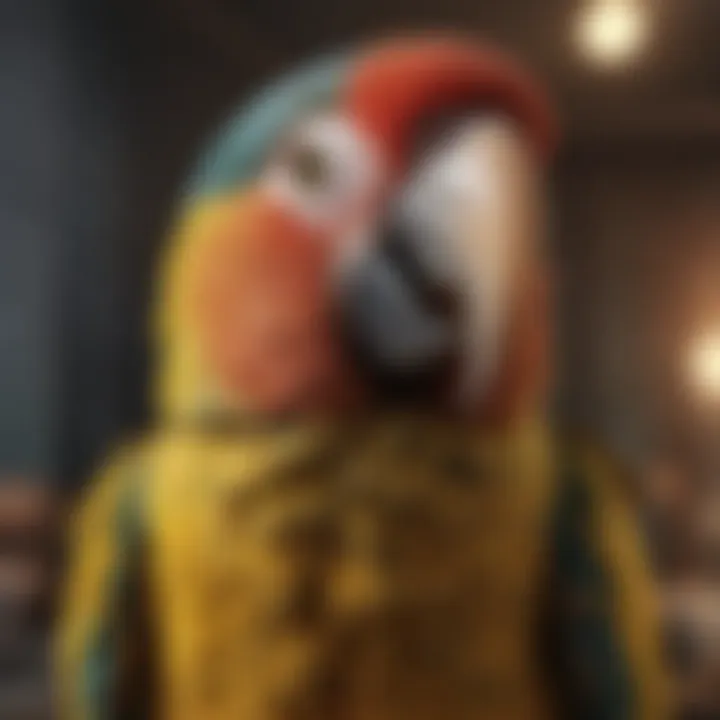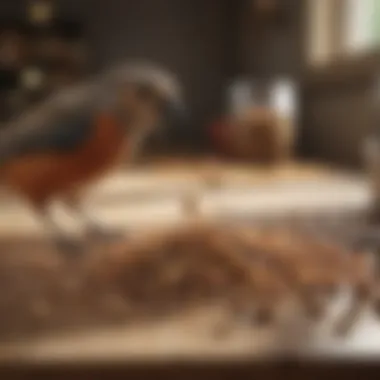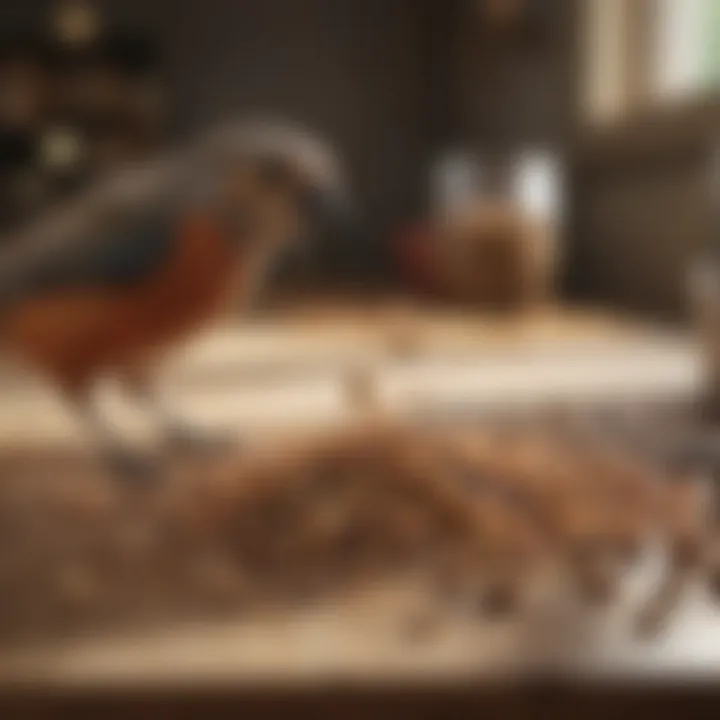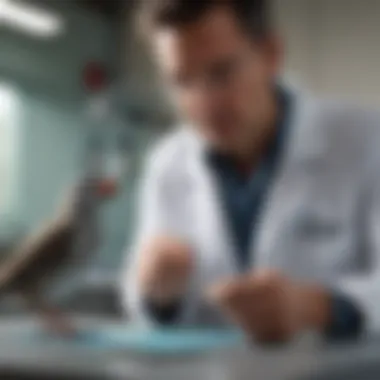Understanding Vomiting in Pet Birds: Causes and Care


Intro
Navigating the world of pet bird care involves a blend of both love and responsibility. Birds are captivating companions, yet they come with unique challenges, particularly when it concerns their health. Vomiting, while often distressing for bird owners, can arise from various causes that range from benign to potentially serious. Recognizing the difference is key to ensuring your feathered friend's well-being. This guide aims to equip owners with essential knowledge about the underlying factors that may lead to vomiting in birds and foster understanding of appropriate care strategies.
Birds can’t exactly tell us when something’s wrong—at least not in plain English—but by observing their behavior, owners can piece together what may be causing issues like vomiting. With a firm grasp on avian basics, owners can create a safe and healthy environment conducive to their birds’ needs.
Avian Care Basics
Importance of Proper Nutrition
A crucial aspect of bird ownership is understanding their nutritional requirements. Pet birds need a balanced diet that often includes a mix of seeds, pellets, fruits, and vegetables. The right nutrients play a vital role in digestive health, which in turn helps prevent vomiting. Different species may require varying diets, so it’s essential to tailor their food to species-specific needs.
Understanding Bird Species and Their Needs
Recognizing the diverse characteristics of different bird species is important. For example, cockatiels may have different dietary needs compared to parrots or budgerigars. Owning a bird isn’t a one-size-fits-all scenario. Owners must research their specific type to ensure that they’re providing adequate care.
Basics of Birds Habitat Setup
Creating a healthy habitat is foundational. A clean, spacious cage with appropriate accessories like perches and toys is a must. Ensuring proper ventilation and avoiding hazardous items can help maintain a stress-free environment. Birds thrive in stimulating settings, which aids in their overall health and can sometimes prevent behaviors that lead to vomiting.
Grooming and Hygiene Tips
Maintaining proper hygiene is key. Regular bathing, nail clipping, and beak care help to prevent infections and maintain overall bird health. A clean environment not only protects birds from illness but also fosters a sense of security, thereby reducing stress-induced issues that could lead to vomiting.
Interacting with Your Pet Bird
Building Trust and Connection
Birds, much like us, have their own personalities. Establishing a bond takes time and patience. Spend quality time talking to and gently handling your bird to build trust. Remember, a calm, loving interaction can go a long way in improving their emotional state.
Training Techniques and Tips
Think of training sessions as fun rather than a chore. Simple tricks or even basic commands can stimulate their minds. Use positive reinforcement, like treats, to encourage desired behaviors. This can foster a happier, healthier bird.
Fun Activities for Bird Owners and Their Birds
Engaging your pet bird with activities like puzzle toys or interactive play can help keep them mentally stimulated and physically active. A happy bird is generally a healthier bird, reducing risks of distress and thus, vomiting.
Recognizing Bird Cues and Behaviors
Every bird has its own language of sorts. Learning to identify cues and behaviors that signal distress can be vital. A bird that is unusually quiet or isn’t eating can be a red flag. Being observant helps in timely interventions.
Emotional Well-Being of Birds
The Role of Play and Socialization
Pets need companionship just as humans do. Social interactions, whether with their owners or other birds, contribute significantly to their emotional health. Playtime is not just a leisure activity; it is crucial for their development and happiness.
Enhancing Birds' Emotional Health
Creating a nurturing environment filled with opportunity for exploration and interaction is key. Birds that feel secure are less likely to show signs of distress, keeping problems like vomiting at bay.
Assessing Bird Stress and Remedies
Stress can arise from various factors, including environmental changes or lack of attention. Symptoms may include changes in behavior, appetite, and even vomiting. Identifying these stressors quickly can allow you to implement remedies before the situation escalates.
Building Strong Human-Bird Bonds
Ultimately, nurturing a strong bond with your bird can greatly affect its health. Time spent together fosters a sense of belonging and security, giving your bird a more balanced emotional state.
"It's not just about feeding your bird, but about feeding their heart and mind too."
Bird Health and Safety
Common Health Issues and Prevention
Understanding common ailments that affect birds is crucial for prevention. Regular check-ups and being vigilant about health fluctuations can make all the difference.
Routine Veterinary Care
Scheduling regular vet visits to monitor your bird's health is essential. Like any pet, prevention is always better than cure.
Environmental Hazards to Avoid
Be mindful of potential hazards in their environment. Things like toxic plants, fumes from non-stick pans, and even household cleaning agents can be detrimental. Always prioritize a safe living space.
Signs of Illness or Distress
Learning the signs of illness or distress—like sudden behavioral changes or vomiting—plays a critical role in your bird’s well-being. Early detection is the key to effective intervention.
Fun Facts and Quirky Insights
Unique Traits of Popular Bird Species
Each bird species comes with its own quirky traits. Knowing these can enhance ownership experience and foster a deeper bond.
Historical and Cultural Significance of Birds
Birds have played significant roles throughout history, as symbols of freedom, messengers of gods, among many other aspects that appeal to their enigmatic nature.


Famous Bird Owners and Their Stories
Many celebrities and ordinary folks have had birds as companions. Their stories often highlight unique bonds and the joys that come with bird ownership.
This guide on understanding vomiting in pet birds provides critical insights, serving as a compass for bird owners to navigate the complexities of avian care. By empowering yourself with knowledge, you ensure not only a healthy bird but a fulfilling relationship.
Preamble to Avian Health
Avian health serves as the cornerstone of responsible pet ownership, especially for those who share their lives with birds. Understanding the nuances of bird health can make a significant difference in detection and prevention of ailments. Birds often mask their discomfort, making it crucial for owners to become attuned to the subtle signs of distress. By recognizing these indicators, one can act swiftly and potentially avert severe health complications.
Benefits of Understanding Avian Health
- Prevention of Disease: Knowing how to identify early warning signs allows pet owners to intervene sooner, leading to better outcomes for their feathered friends.
- Informed Decision Making: Familiarity with avian health issues enables owners to make educated choices regarding diet, lifestyle, and environment, ultimately enriching the lives of their birds.
- Improved Care Techniques: Understanding avian care, from grooming to diet, ensures birds lead healthier lives.
Key Considerations
With birds, the smallest shift in behavior can herald a bigger issue. For instance, a bird that usually sings might go quiet, hinting at potential health problems. Additionally, typical signs like feather plucking or changes in appetite shouldn’t be taken lightly. Knowledge about these indicators cultivates a proactive approach, allowing for timely interventions.
The Importance of Recognizing Health Indicators
Recognizing health indicators can be a real game changer for pet bird owners. Birds, by nature, are prey animals; they instinctively hide signs of illness to protect themselves from potential threats. Owners who understand what is normal for their specific bird species can detect when something isn’t right.
Every bird has its unique behavior patterns. For example, a cockatiel that usually greets you with chatter might be unusually quiet when feeling unwell. Keeping an eye out for these behavioral changes can facilitate early intervention.
Some Common Health Indicators to Watch For
- Vocalizations: Abrupt changes in singing or talking.
- Eating Habits: Sudden lack of interest in food or water.
- Physical Appearance: Unkempt feathers or swelling of the body.
This vigilance can help improve the quality of life for your bird and lead to quicker resolutions if health issues arise.
Overview of Common Avian Disorders
Birds can be prone to various disorders; recognizing these quickly can lead to better management and care. Common avian disorders often present with overlapping symptoms, making it vital for bird owners to be thorough in their understanding.
Here are a handful of prevalent ailments that can affect pet birds:
- Psittacosis: Also known as parrot fever, this is a bacterial infection common in psittacine birds. It can lead to respiratory issues and is zoonotic, meaning it can spread to humans.
- Avian Gastric Yeast Infection: This condition impacts young birds more often than not. Symptoms may include regurgitation, weight loss, and an overall lackluster demeanor.
- Chlamydiosis: Similar to psittacosis, this infection is linked to bacterial spores that can cause systemic illness in birds.
"A stitch in time saves nine. Observing your pet birds closely can save a lot of distress later on."
Understanding these disorders is not just about being aware; it’s about preparing. Knowledge, paired with prompt action and care, goes a long way in ensuring a longer, healthier life for our avian companions.
Understanding the Digestive System of Birds
Understanding the digestive system of birds isn’t just a casual interest for bird owners; it’s the bedrock upon which their health rests. A fundamental grasp of how avian digestion works aids in identifying issues such as vomiting and provides the keys to effective preventive care.
Knowing each component of this unique system helps owners ensure their birds enjoy optimal nutrition and can also alert them to problems developing behind the scenes. Birds have evolved specialized mechanisms for processing food, and any hiccup in this process can lead to health complications, including vomiting. Plus, understanding how a bird’s digestive system is structured gives insight into what constitutes normal versus abnormal behavior and bodily responses.
Anatomical Components of the Avian Digestive Tract
The avian digestive tract is a fascinating combination of anatomy adapted for efficient nutrient absorption. Key components include:
- Beak: This serves not only as a feeding tool but also as an important organ for initial food processing.
- Esophagus: Directly following the beak, the esophagus is a muscular tube that carries food to the crop.
- Crop: The crop acts as a temporary storage pouch, allowing birds to consume food quickly and digest it later.
- Proventriculus: This glandular stomach secretes enzymes necessary for breakdown before reaching the gizzard.
- Gizzard: Acts as a grinding organ, using stones ingested along with food to pulverize it, crucial for further digestion.
- Intestines: Efficiently absorb nutrients; their health is vital for preventing digestive issues.
Each part plays a specific role in processing food, and disturbances in this system can manifest as physical symptoms, including vomiting.
Normal Digestive Processes
In a healthy bird, the digestive processes flow like a well-oiled machine. When food enters the beak, it is ground down and mixed with saliva before being swallowed. The esophagus quickly transports it to the crop, where food may sit for a while. From there, the transition to the proventriculus allows digestive enzymes to kick in, preparing food for the crushing action of the gizzard.
Once finely ground, food moves into the intestines. This is where the absorption of nutrients occurs, essential for overall health and energy levels. The rest of the waste then moves through, being processed until eventually excreted. Normal digestion results in a steady production of feces, indicating everything is running as it should.
Understanding this process is critical. If any component falters—perhaps due to dietary indiscretion, pathogens, or other stressors—the result may be violent regurgitation or vomiting. Recognizing these digestive mechanics allows pet owners to respond quickly to changes, ensuring prompt care if issues arise.
Mechanisms Behind Vomiting in Birds
Understanding how birds vomit is crucial for every pet owner. It's not just about what comes out, but the 'why' and the 'how.' This section highlights the intricate processes that lead to this often alarming behavior. A thorough grasp of these mechanisms can aid in prompt recognition of potential health issues, ensuring your feathered friends receive timely care when needed.
Physiological Triggers of Vomiting
Birds are complex creators, and their bodies react to various stimuli, sometimes resulting in vomiting. The physiological triggers can genuinely run the gamut from simple dietary mishaps to severe health challenges.
- Dietary Choices: Birds are notorious for their selective eating habits. A sudden change in diet, like introducing new seeds or fruits, can shock their system. Even a seemingly harmless food can disagree with your pet bird, leading to gastrointestinal upset.
- Infections and Toxins: Just like humans, birds can get infections. Bacterial or viral agents might disturb their stomach, sending them into a regurgitative episode. Consuming spoiled food or toxic plants can have a similar effect.
- Physical Illness: Underlying health issues, like liver disease or kidney problems, might also trigger vomiting. These conditions disrupt normal function and can be fatal if not addressed quickly.
To spot these physiological triggers, being vigilant about what your bird consumes is essential. Keep an eye on your pet’s eating habits, and don’t dismiss even the smallest oddity; a shift might indicate something more serious.
Common Causes of Vomiting in Pet Birds
The phenomenon of vomiting in pet birds is not just a random occurrence; it often serves as a signal pointing towards other underlying issues. Understanding the common causes of vomiting is crucial for caregivers who strive to maintain their birds' health and well-being. Identifying whether vomiting is a result of dietary factors, infections, or psychological triggers is paramount in determining the appropriate response or intervention. The better you are informed about these triggers, the more effectively you can navigate the waters of avian care.
Dietary Factors
One of the primary culprits behind vomiting in pet birds often boils down to their diet. Birds are not just picky eaters; they can be quite sensitive to their food choices. A sudden change in diet, especially when introducing new foods or treats, can upset their digestive system. This can lead to vomiting, which is their body's way of saying, "Hey, something isn't right!"
Birds, much like humans, may also have food intolerances or allergies. For instance, certain seeds, nuts, or fruits can cause gastrointestinal distress in some species, leading to this unwanted behavior. Regular monitoring of dietary intake is advisable, ensuring that your feathery friend is consuming a balanced and nutritious diet tailored to their specific species’ needs.
Moreover, the quality of the food is essential. Cheap, low-nutrient options can lead to malnourishment, posing a threat to their digestive health. It’s advisable to stick with trusted brands like Kaytee or Harrison's Bird Foods, which offer high-quality formulations specifically designed for different types of birds.
"A bird's diet is a reflection of its health; one should never underestimate this connection."
Infections and Illness


Infections and illnesses present perhaps the most serious reasons for vomiting in birds. Just like any pet, birds can suffer from a range of ailments caused by bacterial, viral, or fungal infections. For instance, conditions like avian gastric yeast or psittacosis can manifest as vomiting. Often, these conditions can be accompanied by other symptoms such as lethargy, changes in feathers, or abnormal droppings.
It’s crucial to keep an eye on environmental hygiene, as unsanitary conditions increase the risk of infectious diseases, elevating the chances of vomiting. Regular cleaning of cages, food and water containers, and play areas goes a long way in promoting a healthier living space.
In addition, a bird that is housed alone may experience stress, leading to potential illness. Regular veterinary check-ups can help catch any underlying infections before they escalate, ensuring timely intervention and treatment.
Psychological Triggers
Believe it or not, the mental well-being of your bird can significantly influence its physical health, including the act of vomiting. Birds experience stress and anxiety, much like humans, and can exhibit vomiting behaviors in response to psychological triggers. Factors such as a change in environment, introduction of new pets, or even loud noises can create stressors that affect a bird's stomach.
Moreover, boredom plays a significant role, too. When a bird lacks mental stimulation, anxiety levels can increase, leading to intentional or unintentional vomiting. Creating a stimulating environment with toys, social interaction, and a routine can alleviate these issues.
To mitigate psychological triggers, try to maintain a stable environment. Familiar routines can help your feathered friend feel secure, thus potentially reducing stress-related vomiting episodes.
By delving into these common causes of vomiting, pet bird owners can gain a clearer understanding of when to intervene and when to consult a vet. Each factor, whether diet, illness, or mental health, plays a critical role in the overall health of your pet bird.
Symptoms Accompanying Vomiting
Authory understanding of the symptoms that accompany vomiting in pet birds is as vital as recognizing the act itself. While vomiting can serve as a warning signal in itself, the behaviors and physical signs that accompany these episodes provide deeper insights into a bird's health and emotional status. Identifying these symptoms allows bird owners to gauge the severity of the issue and make informed decisions about care.
In this section, we will delve into both behavioral changes and physical signs to monitor, emphasizing how these indicators can highlight underlying problems that may require veterinary attention.
Behavioral Changes
Birds are known for their unique behaviors, which reflects their emotional and physical states. When a bird starts to vomit, it’s not just a standalone action; it often comes with a slew of behavioral changes. Pet owners need to be observant. If you notice your bird becoming unusually quiet or withdrawn, those are red flags.
Common behavioral changes that might accompany vomiting include:
- Lethargy: A marked decrease in activity can indicate distress or illness.
- Aggressive Behavior: Sometimes, a bird may react negatively. Pecking or flapping around can be a stress response.
- Decreased Appetite: If your bird suddenly loses interest in food, it could be more than just a temporary feeling.
- Changes in Vocalization: Any sudden shift in the sounds your bird makes may also be a sign of discomfort.
Knowing what’s typical behavior for your feathered friend can help you spot unusual changes. For instance, if your normally cheerful Parakeet becomes a recluse, even the smallest changes should prompt immediate attention.
Physical Signs to Monitor
Physical signs can be the telltale indicators of what's ailing your pet. Monitoring these signs is essential, as they can guide your actions following vomiting. After all, it’s not just about noticing the vomit but knowing what else could be problematic.
Key physical symptoms to watch for include:
- Weight Loss: Keep an eye on your bird’s condition. Sudden weight loss might indicate a severe issue, including a lack of proper nutrition.
- Feather Condition: Look for any signs of ruffled feathers or unusual bareness, which can indicate stress or illness.
- Respiratory Issues: Labored breathing or wheezing can accompany vomiting, especially if allergies or respiratory infections are at play.
- Foul Smell: A strong, unusual odor from the beak can suggest gastrointestinal problems.
Important: Regular screening of these symptoms helps maintain the wellbeing of your avian companion. If you notice a combination of these symptoms signaling distress, it’s prudent to consult a veterinarian promptly.
By staying alert to these behavioral and physical changes, bird owners can better navigate the sometimes murky waters of avian health. Responding quickly and with the right information can make all the difference in what happens next.
Differentiating Between Normal and Abnormal Vomiting
Understanding the distinction between normal and abnormal vomiting is crucial for any pet bird owner. This knowledge can be the difference between addressing a minor issue and catching a potentially serious health concern in its tracks. Vomiting in birds can occur for a multitude of reasons, from simple regurgitation after eating to more severe medical conditions. Knowing when to be concerned can greatly impact your bird's overall well-being.
Normal regurgitation might seem alarming at first, but it is generally a natural process for many species of birds, particularly when feeding their young or in bonding behaviors. This normal behavior does not typically require intervention unless it becomes excessive or is accompanied by other troubling symptoms. Abnormal vomiting, on the other hand, might be a sign of distress that warrants immediate attention.
Early recognition is essential. If a bird starts to vomit repeatedly, changes its eating habits, or exhibits any signs of lethargy or distress, this could indicate a more serious underlying issue.
Key Considerations:
- Frequency of Vomiting: A single occurrence may not be alarming, but a pattern indicates a need for further evaluation.
- Accompanying Symptoms: Vomiting should be assessed in conjunction with other signs like lethargy, change in droppings, or loss of appetite.
- Duration: How long has the vomiting been happening? If it persists beyond a short time, that's a red flag.
- Dietary Factors: Consider the bird's diet. Changes in nutrition can contribute to regurgitation or vomiting episodes.
Educating yourself on these factors as a bird owner helps create a clearer picture of what’s going on with your pet. Not only does this boost your confidence in caring for them, but it also cultivates a proactive approach to their health management.
Identifying Normal Regurgitation
Normal regurgitation typically involves the bird bringing up food shortly after eating. This can often happen during feeding routines, especially in species like parrots, where they may regurgitate to feed their partners or nestlings. Regurgitation often does not produce bile and is usually followed by the bird showing no signs of distress.
Here are some signs to identify normal regurgitation:
- Timing: Occurs shortly after eating.
- Consistency: The material brought up is undigested food.
- Behavior Post-Regurgitation: The bird behaves normally, resuming its activities without signs of pain or discomfort.
If your bird displays these behaviors, it's likely just a part of their natural process. However, if you notice signs such as watery output, color changes, or unusual consistency in what's being regurgitated, it’s time to start considering veterinary consultation.
When to Seek Veterinary Help
Knowing when to seek veterinary assistance can save your bird's life. If your feathered friend is experiencing persistent vomiting or the episodes are accompanied by any of the following symptoms, it is wise to schedule a visit to the veterinarian:
- Continuous or excessive vomiting – If your bird vomits more than once or twice in succession.
- Change in behavior – Signs of lethargy, lack of interaction, or refusal to eat.
- Presence of blood – Any blood in the vomit is a serious sign that needs immediate medical attention.
- Other physical symptoms – Such as diarrhea, weight loss, or difficulty breathing.
Important Note
Always keep an eye on your bird’s overall condition and habits. If something feels off, don’t wait for it to get worse. A swift action could be beneficial.
Remember, prompt intervention is often the key to addressing health issues effectively. Being observant and understanding your bird’s daily habits fosters a deeper bond and leads to a healthier pet.
Intervention Strategies for Ailing Birds
When it comes to ensuring the health of your feathered companions, swift and appropriate intervention is paramount. Recognizing and acting on signs of distress can mean the difference between a quick recovery or a prolonged illness. Understanding intervention strategies begins with knowing what to do in immediate situations as well as how to provide long-term support.
Immediate Care in Suspected Cases
In the event that your pet bird shows signs of vomiting, the first task is caliming your nerves and assessing the situation calmly. Panic can lead to hasty decisions that might not be in the bird's best interest. Start by thoroughly examining the environment for any immediate dangers that could threaten your bird’s safety. This includes checking for remnants of spoiled food, toxic substances, or other hazardous materials that might have caused the vomiting.
After securing the environment, observe the bird closely. Pay attention to its overall behaviour and look for additional symptoms. Is it lethargic? Does it show signs of distress, such as fluffed feathers or excessive vocalization? Keep the bird in a quiet, comfortable area, away from loud noises, and avoid handling it excessively at this stage.


It may be prudent to offer small sips of water or a bland diet like soft fruits, but do not force it to eat or drink, as this could exacerbate the situation. Documenting the frequency and characteristics of the vomiting, such as consistency and color, can provide valuable information for your veterinarian. Always remember, if the vomiting persists for more than a few hours or if your bird shows severe distress, contacting a veterinarian should be your immediate next step.
Long-term Care Approaches
Long-term care for a bird that has displayed symptoms of vomiting is not just about managing the symptoms but also about taking preventive actions to ensure ongoing well-being. First, it’s essential to establish a consistent diet that meets the specific nutritional requirements of your bird's species. Birds can be sensitive to transition in their diet, so introducing any changes should be done gradually. Include seeds, grains, fruits, and vegetables while ensuring everything is fresh and free from contaminants.
Moreover, maintaining a clean living environment is vitally important. Regularly clean the cage and remove any uneaten food that could spoil. Periodic sanitization of the food and water bowls is also crucial to reduce the chances of bacterial infections which can lead to gastrointestinal distress.
Watch for emotional triggers that may lead to vomiting, as psychological stress can impact avian health. Ensuring a tranquil atmosphere and engaging your bird in play and interaction can prevent stress-induced health issues. Regular vet check-ups can be beneficial to monitor your bird's health and catch any developing issues early.
"An ounce of prevention is worth a pound of cure."
The role of interventions is not only reactive but proactive as well. Being educated about the causes of vomiting and acting swiftly helps in ensuring that your pet birds remain healthy and happy.
Veterinary Diagnosis and Treatment Options
When pet birds experience vomiting, it can be a distressing event for both the bird and its owner. Understanding the Veterinary Diagnosis and Treatment Options available is critical to ensuring the well-being of these avian companions. The importance of addressing vomiting through diagnostic means cannot be overstated.
First and foremost, proper diagnosis is the key to tackling any underlying issues that might lead to vomiting. A veterinarian can not only identify the root cause but also rule out serious health threats. This process empowers pet owners to respond with appropriate care strategies tailored to their birds’ needs. Early intervention often makes the difference between a mild issue and a life-threatening condition.
Diagnostic Testing Procedures
In diagnosing the cause behind vomiting in pet birds, veterinarians may employ a combination of several tests. These are designed to provide a comprehensive overview of the bird's health. Some commonly utilized diagnostic tests include:
- Physical Examination: The vet conducts a thorough physical check-up, looking for noticeable signs of distress or abnormal bodily functions.
- Blood Tests: These can reveal metabolic or systemic conditions that may lead to vomiting.
- X-rays: Radiological imaging helps visualize potential obstructions within the digestive tract and assess overall organ health.
- Fecal Tests: Analyzing droppings can identify infections or parasites that may be causing gastrointestinal upset.
"Early diagnosis is pivotal. It sets the stage for effective treatment."
The significance of these procedures lies in their ability to paint a clearer picture of the bird's overall health. Based on the findings, the veterinarian can recommend suitable treatments.
Possible Treatment Modalities
If the diagnosis indicates that the vomiting is due to a specific ailment or imbalance, treatment options will vary depending on the root cause. Here are a few potential treatment modalities:
- Dietary Changes: In many cases, simply adjusting the bird's diet can alleviate the problem. A well-balanced diet tailored to the specific bird species can help maintain a healthy digestive system.
- Medications: From antibiotics for infections to anti-emetics for nausea, appropriate medications help manage and treat underlying health issues. Always closely follow a veterinarian's dosage recommendation.
- Fluid Therapy: If vomiting has led to dehydration, fluid therapy becomes essential. A vet might suggest hydration treatments to restore balance, either orally or via injections.
- Surgery: In certain scenarios, where obstructions or severe conditions are diagnosed, surgical intervention may be necessary to remove blockages or to address other significant health issues.
Integrating these treatment modalities highlights the collaborative approach between pet owners and veterinarians, fostering an environment of informed care for these cherished avian pets. Monitoring response to treatment is vital; keeping an open line of communication with the vet can prove indispensable in the ongoing health management of pet birds.
Preventive Measures and Best Practices
Preventing vomiting in pet birds should be a priority for every bird owner. When you take the right steps, you can greatly reduce the chances of gastrointestinal upset in your feathered friend. Understanding what contributes to the health of your bird is crucial, as the right preventive measures can save your avian companion from distress and other serious health issues.
Dietary Considerations for Pet Birds
The diet of your pet bird is a pivotal element that requires close attention. A bird’s nutritional needs can vary widely based on species, age, and activity level. Here are some fundamental dietary considerations:
- Balanced Nutritional Intake: It’s essential to provide a variety of foods. Seed-based diets often lack the necessary nutrients, so integrating fresh fruits, vegetables, and high-quality pellets is important.
- Regular Feeding Schedule: Establishing a routine can help regulate your bird’s digestive cycle. Birds thrive on consistency. Try feeding them at the same times each day to promote a stable digestive rhythm.
- Hydration: Always ensure that clean water is readily available. Dehydration is a common issue and can occur quickly in birds. It is vital for digestion and overall health.
- For instance, dark leafy greens, sweet potatoes, and berries can provide vital vitamins and minerals.
- Be cautious with avocados and chocolate, as they can be toxic.
Environmental Factors and Stress Reduction
Stress plays an unwelcome role in a bird’s life, leading to various health problems, including vomiting. Here’s how to minimize stress and create a tranquil environment:
- Safe Space: Provide a well-maintained habitat free from dangerous objects or potential hazards. Birds are naturally curious but can get injured if their environment is not secure.
- Social Interaction: Many species of pet birds are social creatures. Spend time with them daily. However, balance is key—don’t overwhelm them with too much attention or noise.
- Routine Maintenance: Keeping their living area clean and organized is also crucial. Rotate their toys regularly to keep them engaged without stressing them out with changes.
Remember: A calm bird is a happy bird. Regular interaction and a consistent environment contribute significantly to your bird’s mental well-being.
The End: Ensuring the Well-being of Pet Birds
In understanding the complexities of vomiting in pet birds, caregivers can truly play a vital role in ensuring the overall health and happiness of their feathered companions. Recognizing the causes and symptoms associated with this phenomenon doesn't just equip bird owners with necessary information; it fosters a proactive approach to avian care. By comprehending when vomiting is part of regular behavior versus when it signals distress, caregivers can minimize risks and enhance their birds' quality of life.
The benefits of being informed extend beyond immediate health concerns. First and foremost, awareness empowers bird owners to take charge of their pets' diet and environment, shaping a safe and nurturing habitat. Having the ability to spot early signs of sickness ensures prompt intervention, which can significantly improve outcomes for ill birds. To put it simply, being prepared is half the battle.
Consider the reality that most owners may not initially recognize vomit as a symptom; the lack of immediate understanding could lead to a delayed response, potentially exacerbating health issues. Therefore, arming oneself with knowledge about general avian behavior, dietary needs, and psychological factors becomes pivotal. This awareness could save precious time when every moment counts.
The realization also paves the way to formulating effective long-term care strategies, which are equally significant. Maintaining emotional stability in birds and fostering trust between the pet and the caregiver allows for easier monitoring of health changes and behaviors.
"Education is a key step in nurturing a safe and healthy environment for pets."
Moreover, emphasizing healthy diets, stress management, and environmental enrichment will likely push the narrative of pet wellness even further. Familiarizing oneself with comprehensive preventive measures allows for a holistic approach to avian health care.
The Role of Caregivers in Avian Health
Caregivers find themselves at the forefront of their pets' health journey. It’s like being both a protecter and an advocate. The role is not just about meeting basic needs but engaging deeply with the unique behaviors, moods, and quirks of each individual bird.
Understanding that pet birds are not merely companions, but rather living beings with distinctive personalities, leads to a more attentive and responsive attitude. Regularly assessing their interactions, vocalizations, and behaviors can provide invaluable insights, allowing for a more responsive care model.
To further enhance this relationship, caregivers should:
- Conduct routine health checks, observing any changes in behavior or appetite.
- Stay informed about avian dietary needs, recognizing that not all seeds and foods are created equal.
- Create a nurturing space where birds can thrive, balancing interaction with opportunities for solitude.
The journey of care sets the stage for interactive behavior that can signal discomfort or health issues early on. By nurturing this dynamic, caregivers can respond swiftly and effectively to any signs of distress, reducing complications in bird health.
Encouraging a Symbiotic Relationship
Creating a mutual understanding between birds and caregivers stands as the bedrock of a healthy avian experience. The notion of a symbiotic relationship suggests that both parties contribute to each other's well-being. For pet birds, this means not just survival, but thriving in an environment that caters to their instincts and preferences.
When caregivers actively engage with their birds, it builds trust and emotional security. Simple activities, like regular interaction, varied playtime, or comfortable handling, are foundational in making birds feel secure. This trust encourages birds to express needs and discomfort, which is essential for early detection of health issues, including vomiting.
Key elements to fostering this relationship include:
- Encouraging natural behaviors, like foraging or socialization, to engage their instincts.
- Providing varied stimuli to stimulate both mental and physical activity.
- Understanding that patience and consistent effort are crucial to this bond, with progress often being gradual yet impactful.
In essence, building a nurturing bond with pet birds feeds into the larger picture of their health and happiness. It's this reciprocal relationship that cultivates an environment where birds not only feel loved but are also healthier and more resilient against stressors.















